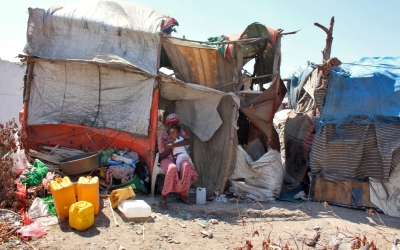UN is investigating the killing of hundreds of migrants in what rights groups say is a 'systemic' pattern of attacks
By MEE staff

The report says the German federal police service and the US military have been involved in training Saudi soldiers currently under investigation by the United Nations over abuses carried out at Saudi Arabia's border with its southern neighbour.
According to the US training agreement, Washington was required to monitor how the training was being used. The agreement also stated that those being trained were only allowed to operate defensively, to protect themselves and their sites from attacks.
The Guardian reported that Saudi authorities have been treating illegal incursions along the Yemen-Saudi border as a "counter-terrorism" issue, which allows them to respond to the movement of people across the border with lethal force.
A source told the newspaper that Saudi Arabia uses extensive electronic surveillance that makes it possible to differentiate between groups of migrants and those involved in armed incursions or drug smugglers.
The training of Saudi authorities by the US military is part of a long-running programme known as Ministry of Interior-Military Assistance Group (MOI-MAG), dating back to 2008. A US official confirmed that the training had taken place.
"The US army Security Assistance Command provided border guards training, which had been funded for a period from 2015-2023, with the funding period ending in July this year," the source told the paper.
German training of Saudi forces started in 2009, and paused only briefly following the 2018 killing of the Washington Post journalist and MEE contributor Jamal Khashoggi in the Saudi consulate in Istanbul.
The training partnerships between Saudi forces and the US and Germany were agreed as part of the kingdom's efforts to bolster its security.
'Deliberate mass killings'
The route into Saudi Arabia has been used by Ethiopian and Yemeni refugees and migrants for years. Many of them are escaping economic hardship and war, with Saudi Arabia being a favoured final destination as well as a transit point towards other Gulf states.
In recent years, the journey has become increasingly dangerous, with around 430 deaths and more than 650 injuries recorded in the 1 January to 30 April 2022 period alone.
Evidence documented by human rights groups includes cases of people being shot at from close range and women facing sexual harassment.

Earlier this month, Ethiopian survivors recounted to Middle East Eye how they were shot at with heavy machine guns.
One described being directly targeted by border guards who would "aim and fire at large rocks, which would send shrapnel and stone flying in multiple directions and maximise casualties amongst the refugees".
Activists have asked why Saudi forces were unable to differentiate between civilians and those who are armed.
The kingdom's surveillance technologies include CCTV, ground monitor sensors and thermal imaging, which help to pick up on the movement and location of people.
According to a detailed and damning report by Human Rights Watch (HRW) this month, survivors said they saw cameras tracking their movements mounted on what looked like "street lamps" on the Saudi side of the border.
In October, several UN special rapporteurs highlighted the killings in a letter, describing them as "gross human rights violations against migrants".
Rights groups say that the attacks were carried out by Saudi and Houthi forces. Saudi authorities have denied responsibility, saying that they did not find any evidence to show violations.
HRW has called on Saudi Arabia to "immediately and urgently revoke any policy, whether explicit or de facto, to deliberately use lethal force on migrants and asylum seekers, including targeting them with explosive weapons and close-range attacks".
The rights group has also called on Riyadh to investigate and discipline those responsible for abuses.

No comments:
Post a Comment